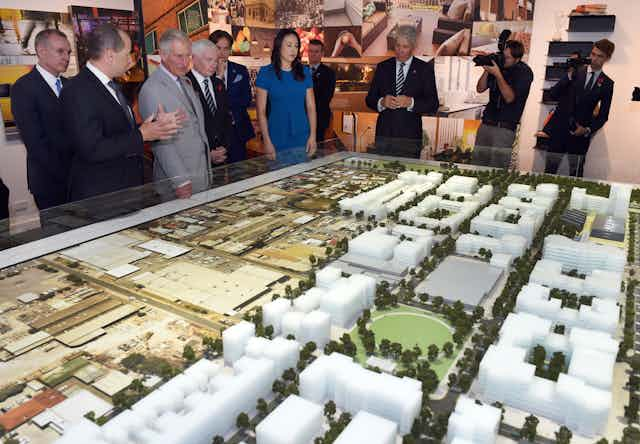The Paris agreement on climate and the global consensus on a comprehensive set of Sustainable Development Goals (SDGs) are signals that a business-as-usual approach to meeting 21st-century challenges is hopeless. A deep societal and economic transformation to sustainable ways of living is essential.
Australia could make a good start towards this transformation by scrapping the Productivity Commission in favour of a contemporary Sustainable Development Commission with teeth. That may seem like a radical suggestion, but the case is compelling and urgent.
Nearly 30 years have passed since the Brundtland Commission report on sustainable development and nearly 25 years since the first Earth Summit in Rio de Janeiro in 1992. Over this time, progress towards sustainable development has been very limited.
In fact, in most countries the human enterprise has become markedly less sustainable and less equitable.
The global climate continues to warm strongly. Global average temperature is rising 170 times faster than over the past 7000 years.
Biodiversity is being lost at rates tens to hundreds of times faster than the background level. We are on the brink of Earth’s sixth great extinction event.
Inequality between and within countries continues to increase rapidly. Oxfam estimates that during 2016, on current trends:
The combined wealth of the richest 1% will overtake that of the other 99% of people.
This inequality significantly impacts our ability to build and maintain social capital and societal well-being. There is strong empirical evidence that societies with higher inequality suffer from more social and health problems.
While GDP of wealthy countries continues to grow, associated environmental and social costs significantly outweigh the economic gains. We should also consider the resources and opportunities we are stealing from future generations.
Transformation challenges and opportunities
The Paris agreement and the SDGs, however, bring new hope that effective steps can be taken to tackle these long-term sustainability challenges.
For Australia, with our population of 24 million people expected to grow to 40 million by 2050, making the deep transformation required for sustainable development is an enormous challenge. But it is also a great opportunity for innovation and advancement in technology, development planning and practice. Importantly, it demands new ways of thinking, collective decision-making and governance.
Proposals for a sustainability commission are nothing new. Ten years ago a cross-party parliamentary Sustainable Cities report recommended the establishment of an independent Australian Sustainability Commission headed by a national sustainability commissioner.
In 2009, another cross-party parliamentary report argued for a “coastal sustainability charter” and a national body to advise in part on sustainable coastal communities.
A National Sustainability Council was established in 2012 and produced a comprehensive report. The council was terminated in 2013.
A new paradigm of priorities
Ten years on, human pressures on our fragile environment have only increased. Yet nationally, we still measure progress using narrow economic indicators such as gross domestic product. We have no long-term sustainability strategy for social and environmental outcomes, or for long-term economic transformation. What kind of Australia do we want to leave the next generation?
The OECD, in reviewing national sustainability strategies, highlighted the importance of policy integration, an intergenerational timeframe, integrated assessment tools (much more than short-term, cost-benefit economics), indicators and targets, and stakeholder engagement. We had some of these, but they have gradually been dismantled. That has left a very large vacuum for a growing nation.
Fundamentally, the long history of failure of sustainability efforts in Australia is one of values, priorities and ways of thinking. The dominant mode of “triple bottom line” approaches has looked like this:

And this brings us back to the Productivity Commission. In essence, this is its approach.
Environmental (especially the global environment) and societal (for example, equity) issues are often marginalised at the expense of short-term cost-benefit economics. This may have brought economic growth, but at the expense of increasingly detrimental outcomes for the health of our societies and the capacity of Earth’s life-support system to sustain us.
Basically, the approach of the Productivity Commission is no longer fit for the 21st century. Its terms of reference are far too narrow to adequately address contemporary social, environmental and economic challenges.
This is why an effective Sustainable Development Commission cannot be an add-on to existing institutions such as the Productivity Commission but must replace them. Current examples of alternative approaches internationally include the Canadian Sustainable Development Act and the Wellbeing of Future Generations Act in Wales.
An effective Sustainable Development Commission demands new values, priorities and ways of thinking. It must use a nested hierarchy of priorities (as below), not a triple bottom line that can be readily traded off in favour of short-term economics.

An Australian Sustainable Development Commission could meet 21st-century challenges by undertaking authoritative studies and providing a non-partisan discussion forum for complex sustainability issues. These include dealing with climate change, managing our growing cities, revitalising our regions, restoring our landscapes and coasts, recognising and respecting Indigenous people on their own terms, and tackling cross-border issues such as transport – the very fast train, for example – or energy transformation.
The commission could help to generate a broad public discussion of the kind of future Australians want for themselves and their children. It could also play a critical role in rapidly disseminating knowledge and experience to key decision-makers in a time of urban and regional transformation.
One thing for sure is we can and must do much better than the present. If we are to build a truly long-term sustainable and desirable future, a deep transformation is required.
An Australian Sustainable Development Commission, with authority, adequate funding and broad support, would send a very clear signal domestically and internationally that we are serious about implementing the SDGs and the Paris agreement. There is no better way to ensure a viable and healthy future for all Australians, both current and future generations.

